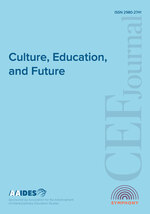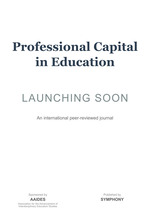Unveiling the stories that illuminate our path: The pedagogical significance of autobiographical study and the method of currere
DOI:
https://doi.org/10.70116/3065457275Keywords:
Autobiographical inquiry, method of currere, pedagogical praxis, lived experiences, transformative educationAbstract
In today’s educational landscape, instrumentalist ideologies embedded in politically entrenched school curricula often overshadow the richness of diverse human experiences, perpetuating colonial shadows within educational experiences. In this paper, through the sharing of our juxtaposed autobiographical stories, we intend to exhibit the pedagogical significance of autobiographical inquiry and the method of currere as empowering individuals to transcend the limitations of an arrested self – a persona moulded by a factory-like schooling system that merely serves instrumental ends. We seek to address the question: How might the process of autobiographical study and the method of currere impact pedagogical praxis attuning it to individual lived experiences? By examining the specificities of each event in an individual's life and reflecting on the interplay between personal experiences and education, teachers and students can better comprehend their world through the lens of their lived experiences. Therefore, this paper underscores the pedagogical importance of autobiographical study and the method of currere encouraging educators to attune with an educational praxis anchored in personal experiences. Furthermore, it introduces the transformative potential of these methods to reimagine the different possibilities of praxis in education.
Downloads
References
Aoki, T. T. (1986/1991/2005). Teaching as indwelling between two curriculum worlds. In W. F. Pinar & R. L. Irwin (Eds.), Curriculum in a new key: The collected works of Ted T. Aoki (pp. 159–165). Erlbaum. (Original work published 1986 and 1991)
Aoki, T. T. (1989/2005). Inspiriting the curriculum. In W. F. Pinar & R. L. Irwin (Eds.), Curriculum in a new key: The collected works of Ted T. Aoki (pp. 357–365). Erlbaum.
Chambers, C. (1994). Looking for a home: A work in progress. Frontiers: A Journal of Woman Studies, 15(2), 23–50.
Connelly, F. M., & Clandinin, D. J. (1990). Stories of experience and narrative inquiry. Educational Researcher, 19(5), 2–14.
Hasebe-Ludt, E., Chambers, C., & Leggo, C. (2009). Life writing and literary métissage as an ethos for our times. Peter Lang.
Heidegger, M. (1953/2010). Being and time (J. Stambaugh, Trans.). State University of New York Press.
Huebner, D. (1999). Curriculum as a concern for man’s temporality. In V. Hillis (Ed.), The lure of the transcendent: Collected essays by Dwayne E. Huebner (pp. 131–141). Lawrence Erlbaum Associates.
Hurren, W. (2016). Contemplating curriculum: Genealogies/times/places. Peter Lang.
Kincheloe, J. L., & Pinar, W. F. (Eds.). (1991). Curriculum as social psychoanalysis: The significance of place. State University of New York Press.
Liu Baergen, P. (2024). Exploring curriculum as a lived experience of poetic dwelling in-between place stories. In G. Gottfriedson & V. Handford (Eds.), Dangling in the glimmer of hope: Academic action on truth and reconciliation. University of Ottawa Press.
Liu Baergen, P. (2021). Tracing Ted T. Aoki’s intellectual formation: Understanding historical, societal, and phenomenological influences. Routledge.
Magrini, J. (2014). Huebner’s Heidegger: Toward an authentic conception of learning and “historicity.” Journal for the Philosophical Study of Education, 2(1), 73–95.
Pinar, W. F. (2011). Nationalism, anti-Americanism, Canadian identity. In L. Yates & M. Grumet (Eds.), World yearbook of education 2011: Curriculum in today’s world (pp. 31–41). Routledge.
Pinar, W. F. (2012). What is curriculum theory? (2nd ed.). Routledge.
Pinar, W. F. (2015). Educational experience as lived: Knowledge, history, alterity. Routledge.
Pinar, W. F. (2022). A praxis of presence in curriculum theory (Studies in Curriculum Theory Series). Routledge.
Pinar, W. F., & Grumet, M. R. (1976). Toward a poor curriculum. Kendall/Hunt.
Pinar, W. F., Reynolds, W. M., Slattery, P., & Taubman, P. (1995). Understanding curriculum: An introduction to the study of historical and contemporary curriculum discourses. Peter Lang Publishing.
van Manen, M. (2007). Phenomenology of practice. Phenomenology & Practice, 1(1), 11–30.
van Manen, M. (2015). The tact of teaching: The meaning of pedagogical thoughtfulness. Routledge.
Downloads
Published
How to Cite
Issue
Section
License
Copyright (c) 2025 Symphony

This work is licensed under a Creative Commons Attribution 4.0 International License.










